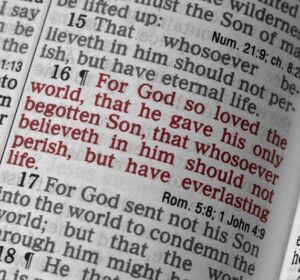Hello! It’s John and please allow me to say: Welcome & Thank You for Your Interest in What Is The Best Way To Study The Bible for growing your relationship with God!
I am a Licensed and Ordained Minister of the Gospel of Jesus Christ and a man transformed by the Love, Power, Promises, and Word of God…It’s my mission to share insights into The Way, The Truth, and The Life, so that you may also enjoy the Fruits of the Spirit — Let’s Grow!!!
 In 1 Corinthians 13:13, the apostle Paul writes, “And now these three remain; faith, hope, and love. But the greatest of these is love.”
In 1 Corinthians 13:13, the apostle Paul writes, “And now these three remain; faith, hope, and love. But the greatest of these is love.”
These virtues are foundational in Christian theology and practice.
Faith, Hope, and Love are essential to living a life that reflects the character and will of God. In this article, we will explore these three pillars of the Christian life, and expound upon their meaning, significance, and practical application.
Faith: What It Is and Why It Matters
Faith is the cornerstone of the Christian journey. It’s the bedrock of spiritual life. When compared to building a house, faith would be the foundation upon which it is built.
It is also the foundation of our belief system. It’s our spiritual bedrock. Without faith, there’s nothing to build upon.
Hebrews 11:6 makes this very clear: And without faith it is impossible to please God, because anyone who comes to him must believe that he exists and that he rewards those who earnestly seek him.
Through their faith, believers enter into a relationship with God and receive His grace. But what is faith, and why is it so essential?
- Faith Defined: Faith, as defined in Hebrews 11:1, is the substance of things hoped for, the evidence of things not seen.
- It is trust in God’s promises, even without physical proof.
- Faith goes beyond intellectual assent. It’s about living with confidence in God’s faithfulness.
- Faith in the Gospel: Faith in Christ is essential for salvation.
- Ephesians 2:8–9 states, For it is by grace you have been saved, through
faith—and this is not from yourselves, it is the gift of God— not by works, so that no one can boast. - Faith in the life, death, and resurrection of Jesus is the pathway to eternal life.
- Ephesians 2:8–9 states, For it is by grace you have been saved, through
- The Testing of Faith: Trials and challenges are opportunities for exercising faith and becoming further strengthened.
- In 1 Peter 1:7, it says, that the trial of your faith, being much more precious than of gold that perisheth, though it be tried with fire, might be found unto praise and honour and glory at the appearing of Jesus Christ:
- Through testing, faith becomes refined, proving its authenticity.
- Faith as a Shield: In Ephesians 6:16, faith is described as a shield that protects against the fiery darts of the enemy.
- It defends believers from doubt, temptation, and spiritual attack, allowing them to stand firm amid adversity.
- Ephesians 6:10-18 instructs us to put on the full armor of God.
Romans 10:17 states, Consequently, faith comes from hearing the message, and the message is heard through the word about Christ.
This means that faith grows and strengthens through engaging with the Bible. The more time you spend in Scripture, the more your faith deepens.
When considering faith with hope and love, faith is the starting point. Faith is a prerequisite for your spiritual journey with Christ. Without it, Hope has no anchor, and Love has no relationship with truth.
All three are crucial, but faith initiates the relationship with God and sets the stage for everything else.
Hope: The Anchor of the Soul
 Hope is often misunderstood as wishful thinking, but biblical hope is much deeper. It is the confident expectation that God will fulfill His promises and that the future is secure in Christ.
Hope is often misunderstood as wishful thinking, but biblical hope is much deeper. It is the confident expectation that God will fulfill His promises and that the future is secure in Christ.
Hope is that flicker of light guiding you through the darkest of tunnels. Romans 15:13 captures its essence: May the God of hope fill you with all joy and peace as you trust in him, so that you may overflow with hope by the power of the Holy Spirit.
This Bible verse isn’t just words on paper; it’s a promise that hope, grounded in God, brings joy and peace.
Hope keeps you moving forward even when the odds are stacked against you. It’s what David had when he faced Goliath and what Joseph clung to throughout his lengthy captivity.
In Jeremiah 29:11 God assures us, “For I know the plans I have for you,” declares the Lord, “plans to prosper you and not to harm you, plans to give you hope and a future.
Hope isn’t wishful thinking; it’s confident expectation rooted in God’s word.
- Hope Defined: Hope in the biblical sense, is the expectation of good based on God’s promises.
- Romans 5:5 states, And hope does not put us to shame, because God’s love has been poured out into our hearts through the Holy Spirit, who has been given to us.
- This is a hope that is sure and steadfast.
- Hope in Christ’s Return: A central aspect of Christian hope is anticipating Christ’s second coming.
- Titus 2:13 describes this as the blessed hope—the glorious appearing of our great God and Savior, Jesus Christ.
- Believers eagerly await the day when Christ will return and establish His kingdom.
- Hope as an Anchor: Hebrews 6:19 refers to hope as an anchor for the soul, firm and secure.
- Hope keeps believers grounded in times of trial and uncertainty, offering stability through the storms of life.
- Hope and Patience: Hope is closely linked to patience and endurance.
- Romans 8:25 teaches, But if we hope for what we do not yet have, we wait for it patiently.
- Hope allows believers to endure suffering with confidence that God is working all things for good (Romans 8:28).
- The Source of Hope: God Himself is the source of hope.
- Romans 15:13 says, May the God of hope fill you with all joy and peace as you trust in him, so that you may overflow with hope by the power of the Holy Spirit.
- True Hope comes from God and is sustained by His Spirit.
While faith lays the groundwork, hope propels you forward. Imagine running a race: faith gets you off the starting line, but hope keeps your eyes on the finish line and keeps you in your lane. It pushes and energizes you to keep going. It provides the second wind when you feel that you can’t go another single step.
It’s not just about surviving; it’s about thriving through challenges because you believe there’s something greater ahead.
Hope and love balance each other out. Where hope looks forward, love grounds you in the present, guiding your actions. Together, they form a powerful duo that transforms entire communities, not merely individual lives.
Hope without love can become selfish and narrow; love without hope may lose its optimism and drive.
 Love: The Greatest of These
Love: The Greatest of These
Among faith, hope, and love, Paul identifies love as the greatest (1 Corinthians 13:13). Why is love elevated above the others? Love is the essence of God’s nature and the highest expression of Christian living.
- Love Defined: 1 John 4:8 declares, “God is love.”
- Love is more than an emotion; it is the very character of God.
- It is selfless, sacrificial, and unconditional, as demonstrated in the life and death of Jesus Christ.
- The Greatest Commandment: When asked about the greatest commandment, Jesus replied, “Love the Lord your God with all your heart, soul, and mind… and love your neighbor as yourself” (Matthew 22:37–39).
- Love is the fulfillment of the law and the essence of Christian life.
- Love in Action: True love is expressed in action.
- 1 John 3:18 instructs, Dear children, let us not love with words or speech but with actions and in truth. Love is more than feelings; it is demonstrated in how we treat others, particularly those in need.
- Love Never Fails: In 1 Corinthians 13:8, Paul declares that “love never fails.”
- While prophecies, tongues, and knowledge will cease, love endures forever.
- Love is eternal, reflecting the unchanging nature of God.
- Perfect Love Drives Out Fear: 1 John 4:18 teaches that “perfect love casts out fear.”
- When believers rest in God’s love, they are freed from the anxieties and fears of life, knowing they are secure in His care.
Love is where it all comes together. It’s not just another virtue; according to 1 John 4:8, Whoever does not love does not know God, because God is love.
Love is the living, active, manifestation of God’s presence. hen you truly understand and practice love, you’re tapping into the very nature of God and surrounding others with the very essence of God.
Without love, everything else collapses. Imagine speaking all languages or having prophetic powers but lacking love. It’s empty, meaningless. That’s what Paul emphasizes in 1 Corinthians 13:1-3. Love elevates our actions from mere tasks to divine missions. It’s what turns ordinary moments into extraordinary blessings.
But what happens when love is missing? We see broken relationships, community conflicts, and general hostility everywhere. Lack of love leads to a sense of emptiness and disconnection from God.
You can trace many of the world’s problems directly to an absence of love. When people don’t experience or extend love, it directly reflects their distance from God.
A loveless heart is a godless heart.
Faith, Hope, and Love in Relationship with God
These three virtues are not independent; they work together to deepen a believer’s relationship with God. Each serves a distinct purpose in the Christian walk but also intertwines with the others to create a holistic spiritual life.
- Faith Leads to Hope: Faith in God’s promises naturally produces hope.
- Romans 5:1–2 speaks of how faith brings peace with God, and through faith, we stand and rejoice in hope of the glory of God.
- Faith is the rock-solid foundation upon which hope is built.
- Love Springs from Faith: Galatians 5:6 says that the only thing that counts is faith expressing itself through love.
- Genuine faith will always lead to love—Love for God and Love for others.
- Faith is the root, Hope is the tree, and Love is the fruit.
- Hope Strengthens Faith: Hope nurtures and strengthens faith by keeping believers focused on the future promises of God.
- When faith is weak, hope motivates us to keep trusting in God’s faithfulness,
- Hebrews 11 recounts the examples of those who lived by faith and died in hope.
- Love as the Fulfillment of Hope: While faith and hope are essential, love is the greatest because it is the ultimate fulfillment of God’s will.
- Within the new heavens and the new earth, Faith will give way to Sight, and Hope will be realized, but God’s Love will be manifested by the actions of believers toward all others.
- The Triad in Spiritual Growth: Spiritual growth involves all three virtues working together.
- Faith begins the journey, hope sustains it, and love perfects it.
- These three virtues help believers grow in Christlikeness and fulfill God’s purpose for their lives.
Practical Ways to Cultivate Faith, Hope, and Love
Living out faith, hope, and love isn’t just about grand gestures; it’s about making these virtues a part of your daily life. It starts with the small, consistent actions that build a strong spiritual foundation.
Studying Scripture is an excellent way to strengthen your faith.
 Dive into the Bible and let its words speak to you.
Dive into the Bible and let its words speak to you.- Take Romans 10:17 to heart: Consequently, faith comes from hearing the message, and the message is heard through the word about Christ. Each day set aside time for reading, reflecting, and understanding God’s word.
This practice roots you deeper in faith and equips you to face life’s challenges with the confidence that you will prevail.
Prayer is another essential tool.
- It’s your direct line to God. Talk to Him about everything—your joys, your fears, your doubts.
- Don’t forget to listen. Sometimes, we get so caught up in asking that we forget to pause and hear God’s responses.
Prayer strengthens your connection to God and helps you maintain hope, even when circumstances seem bleak.
Expressing love can be as simple as acts of kindness.
- Help a neighbor, call a friend, or volunteer your time. These small acts show God’s love in tangible ways and build a sense of community around you.
- Remember, 1 John 3:18 instructs; Dear children, let us not love with words or speech but with actions and in truth. Love is best shown through actions that confirm your faith and hope.
Unconditionally doing for others, will help you understand God’s Love; how to receive it, and offer it to others; friends, family, spouses, even your enemies.
Don’t underestimate the power of fellowship.
- Become part of a community of believers. This provides support, encouragement, and accountability.
- Surround yourself with people who inspire you to grow in faith, hope, and love. Attend church services, join Bible study groups, or just have coffee with a friend to discuss your spiritual journey.
Hebrews 10:24–25 exhorts; And let us consider how we may spur one another on toward love and good deeds, not giving up meeting together.
Being part of a community helps keep faith and hope alive. This is where these virtues come to life through shared experiences and mutual growth.
Meditating on God’s promises can help keep your hope alive.
- Whenever you’re feeling discouraged, take the time to meditate on scriptures that highlight God’s faithfulness, such as Jeremiah 29:11.
- Reflecting on His promises can remind you that He has a plan for your life, filled with hope and a future.
This will help you focus on God and all He has done for you, and it will direct His focus on you.
Incorporate praise and worship into your routine.
- Singing worship songs, whether alone or in a group, or singing along with recordings, lifts your spirit and refocuses your mind on God’s greatness.
- Worship isn’t confined to a Sunday service; it’s a lifestyle that constantly reaffirms your faith, renews your hope, and expresses your love for God.
Sincere Praise and Worship guard against depression and anxiety. It is encouraging, uplifting, and God-honoring.
Conclusion: The Eternal Nature of Faith, Hope, and Love
Faith, Hope, and Love aren’t just temporary virtues; they have eternal significance. While other things may fade, these three endure forever.
 Living with an eternal perspective of faith, hope, and love transforms how we approach daily life. Every act of kindness, each moment of trust, and every glimmer of hope contributes to an unending tapestry woven by God’s hand. These virtues encourage us to live for eternity and not for just today. This makes our lives a radiant testament to God’s enduring presence in us and in the world.
Living with an eternal perspective of faith, hope, and love transforms how we approach daily life. Every act of kindness, each moment of trust, and every glimmer of hope contributes to an unending tapestry woven by God’s hand. These virtues encourage us to live for eternity and not for just today. This makes our lives a radiant testament to God’s enduring presence in us and in the world.
As you continue to strengthen your faith, cultivate hope, and practice love, remember that these virtues are not just for your benefit but are meant to transform the world around you. By embracing faith, hope, and love, you carry a piece of heaven with you, leaving a lasting mark that transcends this life and extends into eternity
Thanks for your interest in growing your relationship with God…
For an in-depth look at other articles and topics, check the dropdown list at the top of the Home page for TruthsofFaith.com
Thanks for your interest in growing your relationship with God.
May God Bless & Keep You & Yours, Always,
John
Founder of TruthsOfFaith.com

Okay, I’ve finished reading the article, “What is Faith Hope & Love For Everyday Living”. It’s a pretty solid piece, John. You’ve got a good grasp of the basics, and you’ve laid out a good foundation for folks to start building their own faith.
But, here’s the thing, you’re talking about making these virtues a part of our daily lives. You mention things like prayer, helping neighbors, and being part of a community. That’s all good stuff. But, what about those of us who are struggling? What about those who have been burned by the church or by people who claim to be Christians? What about those who have been hurt so deeply that they can’t even imagine trusting in God, let alone loving their neighbor?
How do we, as a community, reach out to those people? How do we help them find their way back to faith, hope, and love?
You know, someone once said, “If you want to change the world, start with yourself.” And someone else says, “You gotta be a light in the darkness.” I think that’s what we need to do. We need to be that light for those who are lost, those who are hurting. We need to show them that God’s love is real, even when it’s hard to see.
What do you think?
Eric
Hello Eric!
Thanks for your interest in faith, hope, and love, and how to maintain hope when circumstances seem overwhelming.
You pose the age-old question that has plagued the faithful since the very beginning: How do we reach out to people?
And, yes, some churches have taken advantage of people, and some in the worst way. Other churches have neglected or treated others with callous disregard, all while asking for money.
As you know, there are no perfect people and so there are no perfect churches. If we let the imperfections of others–whether individuals or churches–cause us to be unforgiving, and hard-hearted, or to prohibit our growing closer to God, we are doing ourselves–and God– as well as others, a disservice.
Worldly is as World does and Spirit is as Spirit does. We are called to be forgiving while being wise in the ways of the world and, more importantly, wise in the knowledge of God and our example, Jesus Christ.
Having said that, I will supply you with a list of scriptures that have helped me tremendously—both in my personal growth and in sharing with others to encourage them and admonish them to be steadfast in the Lord and not forsake the fellowship (Hebrews 10:24-26).
Every situation is different and no single scripture is a fix-all for the hurt, the confused, the broken-hearted, the desperate, the forlorn, those at their ropes end, the captive, the suicidal, the angry, the ragers, the despondent, the downtrodden, the burdened, the homeless, the anxious, the ill, the mentally challenged…
There is, however, scripture (single and multiple verses) for every situation; for the encouragement, strengthening, and uplifting of believers and non-believers alike.
For the fearful: 2 Timothy 1:7
For those facing things alone: Joshua 1:9
For those broken-hearted or crushed in spirit: Psalm 34:18
For the weary or weak: Isaiah 40:31; Hebrews 13:5
For those who think they can lose their salvation because of sin: Romans 10:9-10; John 10:28-29
For those who have been beaten down by life: Philippians 4:13
For those who think they can handle things on their own strength: John 15:5
For the unloved: John 3:16
For the weary: Isaiah 40:31
For the Judging: Matthew 7:3-5
For the angry or discontent: Matthew 5:9
For those who are overly aggressive or abusive: Matthew 5:9
For those who mourn: Matthew 5:4
For those who think they cannot go on: James 1:12
For those who are tempted: James 1:13-14
For quarrelsome or those who do not pray or for those who believe they are not receiving answers to their prayers:James 4:1-3
The above is just a partial list, but there are supporting scripture(s) for each one listed and many more for every situation under the sun a person may experience or find themselves in.
I guess to answer your question about how we should reach out to those wronged by the church, those hurt to the point of not trusting God, I would have to say you should do exactly what you are doing: seek guidance and understanding of, and from, the Word of God. and the Holy Spirit.
Just get the scriptures inside you. Read them, whether you understand them or not, because Jesus, himself, says:
But the Comforter, which is the Holy Ghost, whom the Father will send in my name, he shall teach you all things, and bring all things to your remembrance, whatsoever I have said unto you (John 14:26).
It is the Holy Spirit who will call to remembrance the words of Jesus, teach you what they mean, and guide you in their use (for your own growth and more times than not the growth of someone else).
Pray for Widom (James 1:5), and spiritual discernment as to the condition of others, as well as truth. Let your prayer be Isaiah’s when God asked, Whom shall I send? and who will go for us? And I said, here am I. Send me (Isaiah 6:8-13).
Thanks for your interest in growing your relationship with God.
For an in-depth look at other topics, please choose an article from the dropdown menus at the top of the home page of TruthsOfFaith.com
May God Bless & Keep You & Yours, Always,
John
Founder of TruthsOfFaith.com
Thank you for this beautiful and thoughtful exploration of faith, hope, and love! I really appreciate how you broke down each concept and connected them to everyday life and spiritual growth.
One question I have is about balancing faith and hope during challenging times. How do you suggest people maintain hope when circumstances seem overwhelming, and faith is tested? I’d love to hear your thoughts on keeping these virtues strong when facing life’s difficulties.
Hello Aris!
Thanks for your interest in faith, hope, and love, and how to maintain hope when circumstances seem overwhelming.
As you can read on the About John page, I know quite a lot about overwhelming circumstances.
Non-Christians and believers of the Christian doctrine often turn to God when life falls apart. Whether their disastrous situation happens suddenly, or because things have progressively deteriorated over time, they realize it’s too big for them to handle alone. So they seek a solution big enough for their problems. They turn to God.
That was certainly the case for me.
Some people, however, become angry at God and some become hard-hearted against God for allowing the bad thing(s) to happen to them in the first place. Or, for making them endure those things when God, unquestionably, could do something about it.
They don’t understand why, if God is all-powerful and all-loving, he could allow bad things to happen to people; especially good people.
The Biblical account of the entire book of Job is a perfect example of this.He was a man whom God called perfect and upright just before He allowed major adversity and calamity to strike Job and his family.
Read all 42 chapters to see all that he went through; the pressure and advice of friends and family to do the wrong thing and to curse God and die and how Job endured, though angry and questioning God. See how, in the end, God blessed him twice over what he lost because he acknowledged that God knows what he is doing, even when he could not understand why God was allowing it.
Because of what Job endured, people have turned to God, and hung in there with God, for thousands of years since the horrible tragedies befell Job and he decided to simply trust that God knew what he was doing and that he works all things to the good… There is no numbering the many people who may have turned to God and been saved from eternal separation from God because of witnessing others go through overwhelming circumstances and yet remain steadfast for God in the face of their doubts, frustrations, and lack of understanding.
Let me ask you something. If one person avoids eternal separation from God, if one person was saved from hell because of what you were going through, would that not be worth having endured? And what if the person who became saved because of how you endured your troubles led many others to salvation…
Would you not think that God knew what he was doing and thank him for it?
It is impossible to please God without Faith (Hebrews 11:6). Mostly when we are overwhelmed by circumstance, we have a hard time not blaming God. In our hurt or scared confusion we forget that Romans 8:28 assures us that God is working ALL things for the good, and that he will never leave or forsake us, and that he instructs us not to be afraid, or discouraged (Deuteronomy 31:8).
The single scripture that helped me through some really dark times, coupled with those cited in the paragraph above, was 1 Thessalonians 5:18. It is a challenging verse to put into practice amid horrible adversity, but it is the will of God that we thank him for all things and in every situation.
People spend their lives searching for the will of God when it is plainly stated in the above verse. It is the will of God that we thank him in all circumstances... How many circumstances? Yes. All.
When I began to do that, when I began to thank him form my troubles, my entire focus shifted and I found that God blessed me with an abundance of strength and peace and clear thinking… even in the hot midst of adversity, strife, pressure, and sometimes literal attacks, physically, mentally, and emotionally.
Please remember that God honors obedience above sacrifice, meaning that even if you are not able to have gratitude in your heart when you obey him in giving thanks for your troubles, he will honor that above all else.
Another scripture that helps tremendously is one that the apostle Paul penned: I can do all things through Christ who strengthens me (Philippians 4:13)… To know that we do not have to rely on our own strength because Christ will see us through is huge during our personal suffering.
Paul, who had been in prison more frequently, been flogged more severely, and been exposed to death again and again, went through many devastating ordeals. He is an example of pure perseverance and in these verses, he says he has learned to be content in all things and this is considerable with everything he endured. Here is a scriptural list of what he went through:
Paul’s Sufferings:Received forty lashes minus one five times (2 Corinthians 11:24).Beaten with rods three times (2 Corinthians 11:25).
Stoned once (Acts 14:19; 2 Corinthians 11:25).Shipwrecked three times (2 Corinthians 11:25).Imprisoned frequently (2 Corinthians 11:23; Acts 16:23-24).In danger from rivers, robbers, Jews, Gentiles, and false believers (2 Corinthians 11:26).Endured hunger, thirst, cold, and nakedness (2 Corinthians 11:27).Faced pressure from caring for the churches (2 Corinthians 11:28).Flogged and imprisoned in Philippi (Acts 16:22-23).Attacked by mobs in Thessalonica, Berea, and Ephesus (Acts 17:5; Acts 19:28-29).Endured riots and persecution from both Jews and Gentiles (Acts 20:3; Acts 21:27-31).Bitten by a venomous snake but survived (Acts 28:3-6).
Knowing that Christ will see us through is to know that we don’t have to rely on our own wisdom, strength, and non-biblical knowledge—which leaves us confused in the heat of things…
What it boils down to? It’s this: If we are versed in scripture, we have a clear path forward in peace, strength, confidence, and clear thinking. If we do not, we have no direction during those times when we need it most and confusion is added into the mix of hardships—and hard times will come upon us all in this life.
Knowing that others have endured the unbearable, and how being committed to Christ saw them through, gives us hope and courage to face our own dilemmas.
Thanks again for your interest in growing your relationship with God.
For other articles, please see the dropdown menus at the top of the home page of TruthsOfFaith.com.
May God Bless & Keep You & Yours, Always,
John
Founder of TruthsOfFaith.com